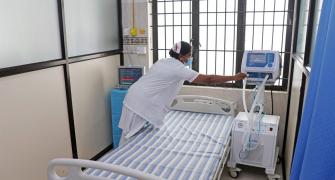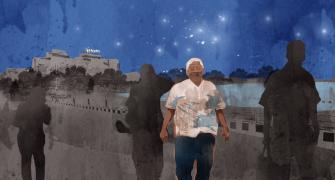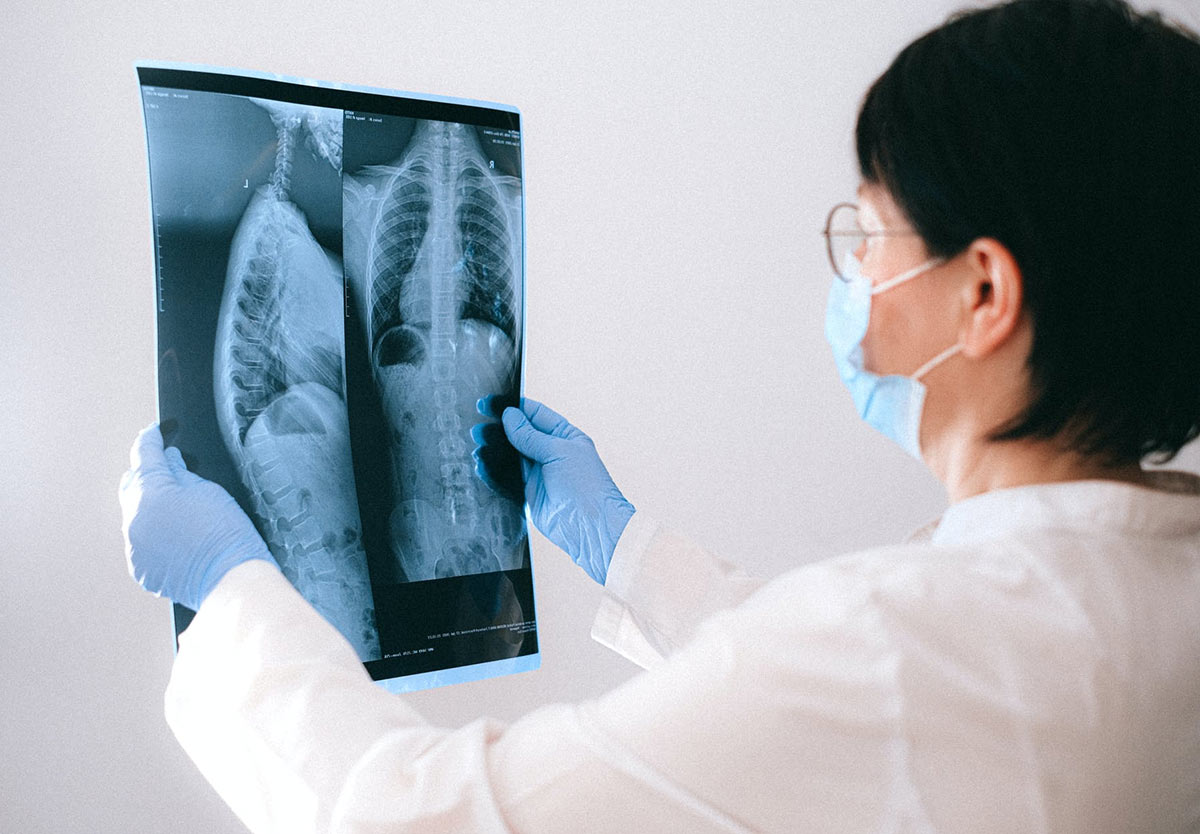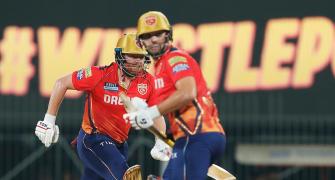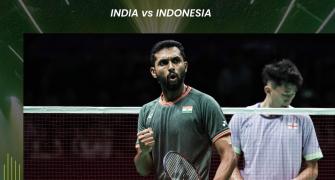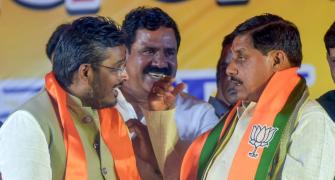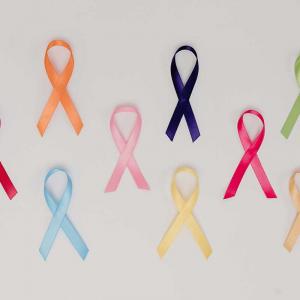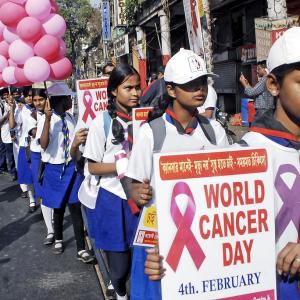'When I was toying with 10 different ideas, my father was diagnosed with lung fibrosis and his condition deteriorated so badly that we lost him in six months. He was very unsatisfied with the lack of proper diagnosis.'
'It made me think will anyone do a biopsy if there is no symptom? Why is it that we do not have any non-invasive diagnostic method?'
'This idea was the strongest out of the ten, and with Snahlata Singh with her cancer biology background joining me, the idea got a real boost.'

According to a paper published in the Indian Journal of Medical Research titled 'Cancer incidence estimates for 2022 & projection for 2025', 'the estimated number of cases of cancer in India in the year 2022 was 14,61,427.
The paper also said that one in nine people in India are likely to develop cancer in his/her lifetime. And lung and breast cancers are the main types of cancer found in males and females, respectively.
According to the Global Cancer Observatory (GLOBOCAN) estimates, there were 19.3 million incidence of cancer cases worldwide in the year 2020 and India ranked third after China and the United States of America.
In 2021, 26.7 million Indians had cancer and by 2025, this number is projected to increase to 29.8 million.
GLOBOCAN predicts that there will be a rise of 57.55% in the number of cancer cases by 2040- from 2020 in India.
Lung cancer is said to be the most common cause of cancer-related deaths worldwide, claiming more lives yearly than breast, colon, and prostate cancers combined.
It is in this background that BiomarkIQ, winner of the Start-up India seed fund of Rs 1.7 million and incubated at IISER, Pune becomes significant as they are in the process of developing a non-invasive tool that can detect lung cancer before any symptom develops.
This detection is much needed for the vulnerable population like the smokers, those working in the vulnerable industries like cotton, coal, cement, etc.
BiomarkIQ is also incubated at the Science and Technology Park at the University of Pune, where they received the Department of Science and Technology's Nidhi Prayas grant of Rs 800,000 in August; their first grant.
"When we started, we had zero things in hand. But we had decided that even if we didn't get a monthly income, that was okay until the product is built," Dr Manasi Kulkarni-Khasnis -- who co-founded BiomarkIQ, first of its kind in Asia, along with Snahlata Singh -- tells Rediff.com's Shobha Warrier.

How did you become an entrepreneur? Was it a dream of yours, or was it by accident?
It was a dream of mine to be an entrepreneur from my school days.
I studied in a Marathi medium school in Pimpri in Pune. A quote in a chapter in the text book remained in me; that, instead of getting employed, we should create employment!
The chapter also talked about getting empowered by creating employment. The empowerment aspect of the idea appealed to me even as a child; that you can empower yourself, empower others and empower your country.
Why it impacted me more was because my parents who were doctors by profession, had their own clinic. They never worked for anybody else.
So, from my young days itself, it was never a dream of mine to get employed somewhere.
But once I started my engineering in biotechnology and later on my PhD in X-ray crystallography at IISER, Pune, I totally forgot about my dream on entrepreneurship.
After I got my PhD, I joined NCCS (the National Centre for Cell Science, a Government of India biotechnology institute) as a scientist in the Pune campus.
From there, I moved to the corporate sector, and worked there for three years.
Last year, I decided to be an entrepreneur.
What was the trigger this time after having forgotten about entrepreneurship for quite a few years?
Even when so many of classmates went abroad for higher studies and to do a post-doc, I was very sure that I would study and work only in India. I also didn't want to work for companies that are based outside India.
But here I was working for a US-based company. One day I had to ask myself, what am I doing? Why am I not doing the same job for people here?
That was the triggering point. And I quit my job in September 2022 to become an entrepreneur.
Did you have a specific idea in mind before you quit?
I didn't have one specific idea when I quit my job. In fact, I had ten ideas in my mind.
I knew, before jumping into entrepreneurship, I should do some market analysis and then figure out which idea I should follow.
I was also absolutely sure that I would not be able to do it all alone; I needed partners and helping hands.
I sat down with my husband and discussed our financial situation. I have to say, he was very supportive. In typical Maharashtrian families, people do not encourage us to leave our jobs and do something of our own!
But when I was not happy what I was doing and when I got the calling that I had to do something on my own, I got the support to go ahead.
How were your initial days as an entrepreneur?
I discussed my ideas with those in different scientific segments. Snahlata was my colleague in my previous company and even while employed there, we used to discuss many ideas that could be taken forward.
She had already resigned from the job after her childbirth.
Both of us were highly entrepreneurial in our thoughts. Moreover, her husband is a very successful entrepreneur in Pune.
So, we clicked both in our entrepreneurial and scientific mindset. Above all, she has a strong base in cancer biology as she has done her post doc in that area.
I read that you lost your father to lung cancer. Is that the reason why you decided to zero in on the idea to develop a tool for the early detection of lung cancer?
Yes. When I was toying with ten different ideas, my father was diagnosed with lung fibrosis and his condition deteriorated so badly that we lost him in six months. He was very unsatisfied with the lack of proper diagnosis.
It made me think will anyone do a biopsy if there is no symptom? Why is it that we do not have any non-invasive diagnostic method?
This idea was the strongest out of the ten, and with Snahlata with her cancer biology background joining me, the idea got a real boost.
That's why we decided to pursue this idea.
Can you tell us how the biomarker works?
We were sure that what we were going to develop a tool that would not be invasive.
Though we can analyse blood, urine or sputum, we narrowed down on the biomarkers in blood which are indicative of early signs of cancer.
We then invented a clinical inference engine which based on the biomarker value, can prepare a hyper personalised report for the person. Biomarker will be a number which will converted to a clinical conclusion by the engine. We named it VarSee (Var for Variant and See for analyse)
Along with the biomarker value, you have to also add personal variables like genetic pre-disposition of the person, the area where he stays, the air quality of the area, whether he is a smoker or a passive smoker. All these personal variables play a major role in the final diagnosis.
The scientific markers and the personal variables together help in getting a hyper personalised diagnosis of the person.
Does that mean both blood test and the software are needed for a proper diagnosis?
Yes, you need the biomarker result from the blood test, and then the software analyses it. Both are needed for the right diagnosis.

Who developed the software?
Since both Snahlata and I are basic science scientists, and we didn't know how to code, we needed a technical person in our team. So, we started looking for people who can align with our vision.
We found a very young Atharva Joshi. He is only 24!
We founded BiomarkIQ in November 2022. Atharva became our tech co-founder and serves as the Chief Technology Officer. I work as the CEO and Snahlata is the Chief Scientific Officer.
We also have two biomarker scientists, one of them works for us from France.
Did you have difficulty getting investors?
When we started, we had zero things in hand. But we had decided that even if we didn't get a monthly income, that was okay until the product is built.
We had nothing to lose, and it was our passion.
We started by pitching the idea to different people and participating in many competitions.
In the first six months itself, we got two grants. The first was the Nidhi Prayas grant of Rs 8 lakhs from the Department of Science and Technology, and then we got the second one of Rs 17 lakhs from NITI Aayog.
Do you think people will get tested for cancer if there are no symptoms?
I admit that will be the biggest challenge we will encounter. It is true when they do not have symptoms, they will not get themselves tested.
It will take time to build awareness. We need to educate family physicians too.
Many people go for annual medical check-ups these days, and many women do mammogram though they do not have any symptoms. Do you feel this also should be part of such health check-ups?
Absolutely. Like you said, this is like a mammogram. Without any symptom, women go for the test. That's because of awareness.
Similarly, hospitals that do medical check-ups should include this test too. All they have to do is, install the software in their machines.
We are designing it in such a way that hospital do not need to procure any instrument to check the biomarkers.
One parallel I can give is like the RTPCR test we used to do for COVID-19.

How aware and open are doctors and hospitals to do this test?
I was under the impression that there will be resistance to adopt new technologies in the market. But when I went to the Indian Cancer Congress in Mumbai recently, I found that doctors were quite welcoming to this idea.
I didn't know till then that there are departments for preventive oncology.
But there isn't anything available right now for early cancer screening in India.
Will you be able to use the same technology for other type of cancers too?
Yes, you can. We are building the technology in such a way that it will be like plug and play. It is cancer diagnostic.
But we are starting with lung cancer and later on, we can replace the same technology for neurological cancer or endocrinal cancer or any other cancer where early detection is extremely difficult. Because it is plug and play, it will not be difficult to move to other cancers too.
When do you expect the biomarker tool to be in the market?
It took us five-and-a-half months to come up with the pilot biomarker.
Now, we are using the investment to validate the pilot. Once the validation is over, we can start the beta product.
I think we will be able to enter the market in two years from now.
Feature Presentation: Ashish Narsale/Rediff.com


